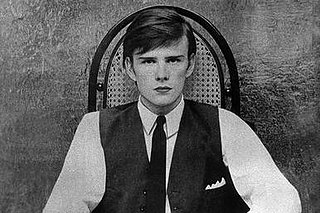
Stuart Fergusson Victor Sutcliffe was a Scottish painter and musician best known as the original bass guitarist of the English rock band the Beatles. Sutcliffe left the band to pursue his career as a painter, having previously attended the Liverpool College of Art. Sutcliffe and John Lennon are credited with inventing the name "Beetles" (sic), as they both liked Buddy Holly's band, the Crickets. They also had a fascination of group names with double meanings, so Lennon then came up with "The Beatles", from the word beat. As a member of the group when it was a five-piece band, Sutcliffe is one of several people sometimes referred to as the "Fifth Beatle".
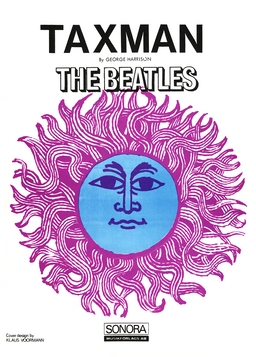
"Taxman" is a song by the English rock band the Beatles from their 1966 album Revolver. Written by the group's lead guitarist, George Harrison, with some lyrical assistance from John Lennon, it protests against the higher level of progressive tax imposed in the United Kingdom by the Labour government of Harold Wilson, which saw the Beatles paying over 90 per cent of their earnings to the Treasury. The song was selected as the album's opening track and contributed to Harrison's emergence as a songwriter beside the dominant Lennon–McCartney partnership. It was the group's first topical song and the first political statement they had made in their music.

"Something" is a song by the English rock band the Beatles from their 1969 album Abbey Road. It was written by George Harrison, the band's lead guitarist. Together with his second contribution to Abbey Road, "Here Comes the Sun", it is widely viewed by music historians as having marked Harrison's ascendancy as a composer to the level of the Beatles' principal songwriters, John Lennon and Paul McCartney. Two weeks after the album's release, the song was issued on a double A-side single, coupled with "Come Together", making it the first Harrison composition to become a Beatles A-side. The pairing was also the first time in the United Kingdom that the Beatles issued a single containing tracks already available on an album. While the single's commercial performance was lessened by this, it topped the Billboard Hot 100 in the United States as well as charts in Australia, Canada, New Zealand and West Germany, and peaked at number 4 in the UK.

The Complete Beatles Recording Sessions is a reference book on the English rock band the Beatles compiled by author Mark Lewisohn. Hamlyn published it in the UK in 1988 and Harmony Books published it in the US.
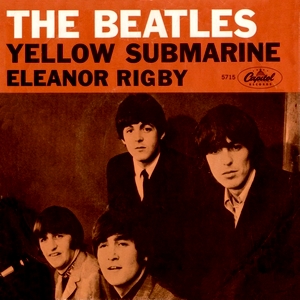
"Eleanor Rigby" is a song by the English rock band the Beatles from their 1966 album Revolver. It was also issued on a double A-side single, paired with "Yellow Submarine". The song was written primarily by Paul McCartney and credited to Lennon–McCartney.

"Savoy Truffle" is a song by the English rock band the Beatles from their 1968 album The Beatles. The song was written by George Harrison and inspired by his friend Eric Clapton's fondness for chocolate. The lyrics list the various flavours offered in Mackintosh's Good News chocolates and serve as a warning to Clapton about the detrimental effect that his gorging would have on his teeth. Along with Clapton's guest appearance on the White Album track "While My Guitar Gently Weeps" and Harrison reciprocating on Cream's "Badge", it is one of several songs that mark the start of a long-lasting musical association between the two guitarists.
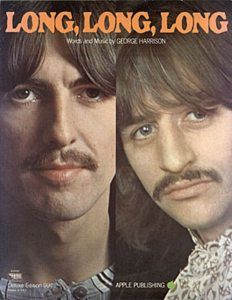
"Long, Long, Long" is a song by the English rock band the Beatles from their 1968 album The Beatles. It was written by George Harrison, the group's lead guitarist, while he and his bandmates were attending Maharishi Mahesh Yogi's Transcendental Meditation course in Rishikesh, India, in early 1968. Although Harrison later stated that he was addressing God in the lyrics, it is the first of his compositions that invites interpretation as both a standard love song and a paean to his deity.

"The Fool on the Hill" is a song by the English rock band the Beatles from their 1967 EP and album Magical Mystery Tour. It was written and sung by Paul McCartney and credited to the Lennon–McCartney partnership. The lyrics describe the titular "fool", a solitary figure who is not understood by others, but is actually wise. McCartney said the idea for the song was inspired by the Dutch design collective the Fool, who derived their name from the tarot card of the same name, and possibly by Maharishi Mahesh Yogi.
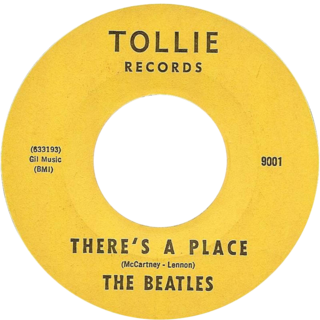
"There's a Place" is a song by the English rock band the Beatles from their debut album, Please Please Me, released in March 1963. It was written primarily by John Lennon and credited to McCartney–Lennon. In the United States, the song was released in July 1963 on the group's first US LP, Introducing... The Beatles, later reissued in January 1964 as Beatlemania surged there. It was also issued as a non-album single in the US, in March 1964, as the B-side to "Twist and Shout", reaching number 74 in the Billboard Hot 100.
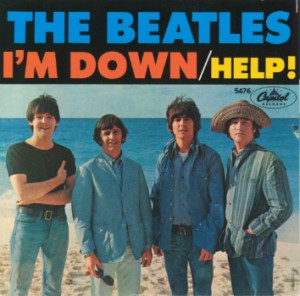
"I'm Down" is a song by the English rock band the Beatles, written by Paul McCartney and credited to Lennon–McCartney. It was released on a non-album single as the B-side to "Help!" in July 1965. The song originated in McCartney's attempt to write a song in the style of Little Richard, whose song "Long Tall Sally" the band regularly covered.

"Magical Mystery Tour" is a song by the English rock band the Beatles and the title track to the December 1967 television film of the same name. It was released on the band's Magical Mystery Tour soundtrack record, which was a double EP in Britain and most markets but an album in America, where Capitol Records supplemented the new songs with tracks issued on the Beatles' 1967 singles. The song was written primarily by Paul McCartney and credited to the Lennon–McCartney partnership.
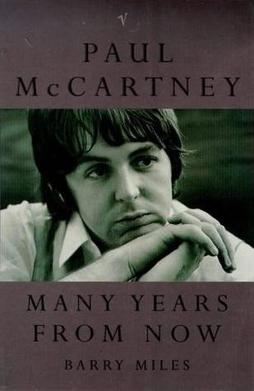
Paul McCartney: Many Years from Now is a 1997 biography of Paul McCartney by Barry Miles. It is the "official" biography of McCartney and was written "based on hundreds of hours of exclusive interviews undertaken over a period of five years", according to the back cover of the 1998 paperback edition. The title is a phrase from McCartney's song "When I'm Sixty-Four", from the Beatles' 1967 album Sgt. Pepper's Lonely Hearts Club Band. The book was first published in the United Kingdom in October 1997 by Secker & Warburg.

"Raunchy" is an instrumental by American rock and roll artist Bill Justis, co-written with Sidney Manker and produced by Sam Phillips. The tune, from the album Cloud 9, was released as a single on the record label Phillips International Records, a sub-label of Sun Records, on September 23, 1957.
Philip Norman is an English author, novelist, journalist and playwright. He is best known for his biographies of the Beatles, the Rolling Stones, Buddy Holly and Elton John. His other books include similar studies of John Lennon, Mick Jagger, Paul McCartney and Eric Clapton.
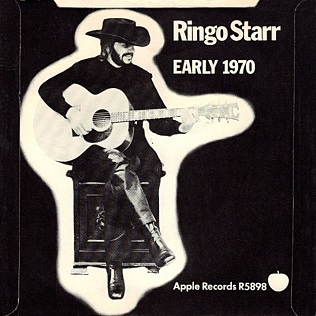
"Early 1970" is a song by English rock musician Ringo Starr that was released as the B-side of his April 1971 single "It Don't Come Easy". A rare example of Starr's songwriting at the time, it was inspired by the break-up of the Beatles and documents his relationship with his three former bandmates. The lyrics to the verses comment in turn on Paul McCartney, John Lennon and George Harrison as individuals, and the likelihood of each of them making music with Starr again. In the final verse, Starr offers a self-deprecating picture of his musical abilities and expresses the hope that all four will play together in the future. Commentators have variously described "Early 1970" as "a rough draft of a peace treaty" and "a disarming open letter" from Starr to Lennon, McCartney and Harrison.

You Never Give Me Your Money is a book by author and music journalist Peter Doggett about the break-up of the English rock band the Beatles and its aftermath. The book was published in the United Kingdom by The Bodley Head in September 2009, and by HarperStudio in the United States in 2010. In the UK, it was subtitled The Battle for the Soul of The Beatles, while the subtitle for US editions was The Beatles After the Breakup.

The Love You Make: An Insider's Story of the Beatles is a 1983 book by Peter Brown and Steven Gaines. Brown was personal assistant to the Beatles' manager, Brian Epstein, a senior executive at Apple Corps, as well as best man to John Lennon at the latter's wedding to Yoko Ono in March 1969.

In late August 1967, the English rock band the Beatles attended a seminar on Transcendental Meditation (TM) held by Indian teacher Maharishi Mahesh Yogi at a training college in Bangor in north-west Wales. The visit attracted international publicity for Transcendental Meditation and presented the 1960s youth movement with an alternative to psychedelic drugs as a means to attaining higher consciousness. The Beatles' endorsement of the technique followed the band's incorporation of Indian musical and philosophical influences in their work, and was initiated by George Harrison's disillusionment with Haight-Ashbury in San Francisco, which he visited in early August.
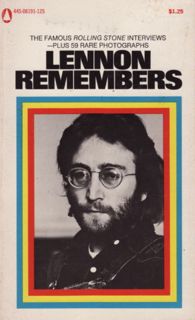
Lennon Remembers is a 1971 book by Rolling Stone magazine co-founder and editor Jann Wenner. It consists of a lengthy interview that Wenner carried out with former Beatle John Lennon in December 1970 and which was originally serialised in Rolling Stone in its issues dated 21 January and 4 February 1971. The interview was intended to promote Lennon's primal therapy-inspired album John Lennon/Plastic Ono Band and reflects the singer's emotions and mindset after undergoing an intense course of the therapy under Arthur Janov. It also serves as a rebuttal to Paul McCartney's public announcement of the Beatles' break-up, in April 1970.

The Beatles: The Authorised Biography is a book written by British author Hunter Davies and published by Heinemann in the UK in September 1968. It was written with the full cooperation of the Beatles and chronicles the band's career up until early 1968, two years before their break-up. It was the only authorised biography of the Beatles written during their career. Davies published revised editions of the book in 1978, 1982, 1985, 2002, 2009, and 2018.



















